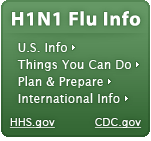Seven Things You May Not Know about Women's Health
Lesser-known conditions and diseases affect the health or safety of millions of women or girls each year. Learn about some of them and what you can do.
1. Asthma occurs more often in women than men. Older adults, women, and African Americans are more likely to die due to asthma.
1. Asthma occurs more often in women than men. Older adults, women, and African Americans are more likely to die due to asthma.
- Women with asthma should always try to avoid asthma triggers.
- Known asthma triggers include pollen, mold and tobacco smoke.
- Know your triggers and learn how to avoid them.
- Work with your doctor to develop an asthma action plan that will help you take your medications correctly and avoid your asthma triggers.
2. Heavy menstrual bleeding, lasting more than seven days or very heavy, affects more than 10 million American women each year. That is about one out of every five women.
- A bleeding disorder may be the cause of heavy menstrual bleeding.
- Talk to your doctor or nurse if you have heavy menstrual bleeding to determine if you need testing.
- Learn about possible causes, including the signs and symptoms of a bleeding disorder.
3. About 27 million women in the U.S. have a disability , a condition of the body or mind that makes it more difficult to do certain activities and interact with the world around them.
- More than 50% of women older than 65 are living with a disability. The most common cause of disability for women is arthritis or rheumatism.
- Women with disabilities need the same general health care as women without disabilities, and they may also need additional care to address their specific needs. However, research shows that many women with disabilities may not receive regular health screenings, like mammograms or a Pap test, as recommended.
- Learn about tools and health resources for women with disabilities.
4. Infertility affects about 6% of married women ages 15-44. Also, about 12% of women 15 - 44 years of age in the U.S. have difficulty getting pregnant or carrying a pregnancy to term, regardless of marital status.
- Infertility is defined as not being able to get pregnant after one year of unprotected sex.
- Several things increase a woman's risk of infertility, including age, smoking, excessive alcohol use, extreme weight gain or loss, or excessive physical or emotional stress that results in the absence of a menstrual period.
- Infertility may be treated medically, surgically, or using assisted reproductive technology depending on the underlying cause.
- Assisted Reproductive Technology, also known as ART, includes all fertility treatments in which both eggs and sperm are handled.
- Learn more about what you can do to be healthy before, during, and after ART treatment. Resources are available for patients preparing for infertility treatment and pregnancy.
5. Bacterial vaginosis (BV) is the most common vaginal infection in women ages 15-44.
- BV is an infection caused when too much of certain bacteria change the normal balance of bacteria in the vagina. In the United States an estimated21.2 million (29.2%) women ages 14–49 have BV.
- The cause of BV is unknown. BV is linked to an imbalance of "good" and "harmful" bacteria that are normally found in a woman's vagina.
- Basic prevention steps that may help to lower your risk of developing BV include not having sex, limiting the number of sex partners you have, and not douching.
6. Sex Trafficking is a serious public health problem that affects the well-being of individuals, families, and communities. The majority of victims are women and girls.
- Sex trafficking is defined as "the recruitment, harboring, transportation, provision, or obtaining of a person for the purpose of a commercial sex act" by the Trafficking Victims Protection Act of 2000 .
- Consequences can be immediate and long term, including physical problems and relationship problems, psychological concerns , and chronic health outcomes.
- Learn about what communities and groups can do to prevent trafficking.
- Women are more likely to have chronic pain, be prescribed opioid pain relievers, and use them for longer time periods than men.
- Addiction to prescription opioids is the strongest risk factor for heroin addiction, and heroin use has increased among women.
- Women should discuss all medications they are taking with their doctor and use prescriptions only as directed. Get help for substance abuse problems (1-800- 662-HELP); call Poison Help (1-800-222-1222) for questions about medicines, or see your pharmacist.
































No hay comentarios:
Publicar un comentario